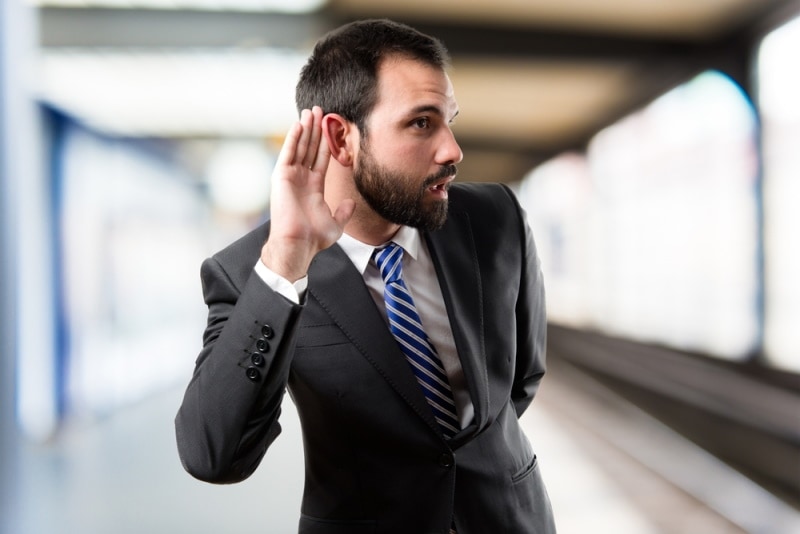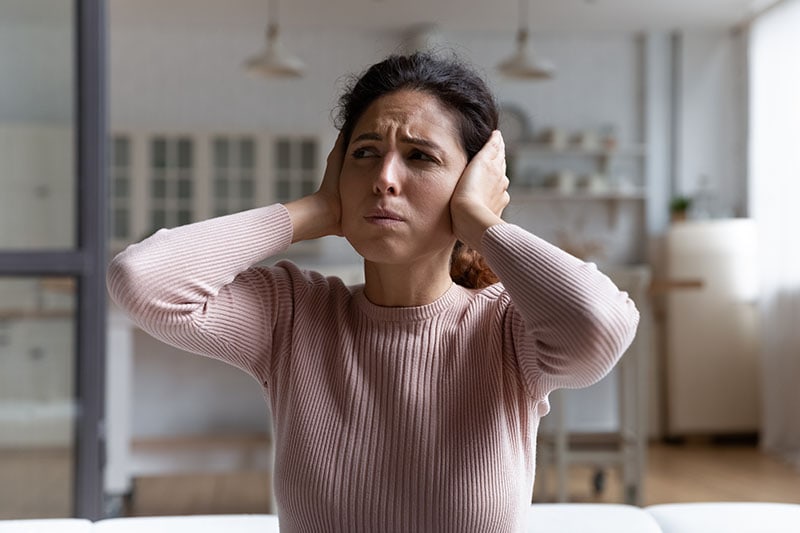How Loud is Too Loud for the Human Ear? (Decibel Guide)
-
Jana Blagojevic
- Last updated:

Hearing some sounds for an extended period might cause temporary or permanent hearing loss because they are too loud for the human ear to handle. The levels of decibels a particular sound has can be one of many factors to determine how humans perceive that sound. While some ordinary noise may be only annoying to us, hearing it repeatedly or continuously can cause minor harm to our hearing. That is why it is necessary to know the recommended time of hearing certain noises and which noises can harm our hearing. How loud is too loud for our ears depends on the intensity of the sound, its distance, and our exposure to it.
Continue reading the article below to find more information about how human ears perceive loud sounds and how loud is too loud for the human ear.
Dangerous Decibel Levels for the Human Ear
Certain circumstances can lead to loud noises being emitted for longer. If you find yourself next to a construction site or need to use a power tool yourself, you must understand the consequences. All noises with 85 decibels or above are considered harmful to the human ear after long exposure.
Prolonged exposure can sometimes mean 5 or 10 minutes, but with 85 decibels, 8 hours is the recommended daily limit. This boundary that separates the safe and the dangerous levels is often quite similar—while finding yourself in the middle of a crowded city traffic is annoying, it shouldn’t be harmful to you. Nevertheless, mowing your lawn or using a vacuum cleaner can harm your hearing after only 2 hours of continuous exposure. The more decibels a specific sound carries, the more dangerous it will be for your hearing.

Everyday Sources of Loud Noises
There are certain noises we can’t escape that we hear and experience daily. These noises are usually entirely safe for us, such as an AC unit or a normal conversation, while there are noises that can become quite annoying such as honking cars in traffic. In the table below, you can find the most common noises, their intensity, and their effect on people.
| Common sounds | Sound levels (dB) | Amount of damage after continuous exposure |
| Breathing | 10 |
Safe levels of sound |
| Ticking watch | 20 | |
| Light rain | 30 | |
| A quiet office | 40 | |
| The refrigerator humming | 50 | |
| Air conditioning | 60 | |
| A vacuum cleaner or washing machine | 70–75 | Annoying noises but safe |
| City traffic | 80 | |
| Leaf blower | 85 | Hearing damage after 1–2 hours of exposure |
| Motorcycle | 95 | |
| A train horn, shouting in the ear | 110 | Hearing damage after 2 minutes |
| Sirens, rock concerts | 120–125 | Hearing damage after only 10 seconds |
| Jackhammer | 130–135 |
Pain and ear injury after a few seconds |
| Firecrackers | 140 | |
| Shotgun, handgun | 150 |
The Loudest Recorded Sound
After seeing what a noise of 150 decibels can cause to a person’s hearing, you are probably wondering if any sounds can cause immediate and permanent hearing loss. One such occurrence, when a sound was so loud it could burst your eardrums, was on August 27th, 1883, when a volcanic eruption caused the loudest noise ever recorded by human beings. The noise was measured at 310 decibels on the Indonesian Island of Krakatoa and was so intense that people could feel it worldwide. Sound waves traveled across the globe seven times in 5 days, causing tsunamis. When pressure that great reaches your ear, the eardrum can begin vibrating so violently that it can rupture.
Factors That May Affect Hearing Loss
While some noises may not be intense enough to affect your hearing, mixing longer periods into the equation can quickly lead to an unsafe situation. Similarly, when you are too close to the source of noise, such as a siren, a horn, or speakers at a concert, the noise will have more effect on your ears.
Sound Level
As we’ve mentioned before, the louder one sound gets, the more damage it can do to your hearing. Many jobs require their workers to wear earmuffs to prevent any permanent damage. Listening to music on your headphones at the highest volume can often be measured up to 110 dB. While some manufacturers may provide you with an option to limit the volume, they are not required to set the sound level to be safe.

Distance
As you move closer to the device emitting loud noises, the sound naturally gets louder. This doesn’t necessarily mean that the sound has lower decibel levels; it only means you perceive them to be safer when you are at a distance.
Time
If you ever encounter a loud noise that hurts your ears, make sure not to expose yourself for longer than a few minutes. When you are exposed to loud noises over an extended period, the potential damage to your hearing increases. This means that your hearing loss will degrade gradually, leading to permanent and irreversible effects.

When Is Your Hearing at Risk?
Every person’s hearing varies, and what some may consider loud, others find acceptable. There are ways you can tell when certain sounds are too loud for your ears. When you find yourself in certain situations such as parties, loud bars, or concerts, you may experience some or all of the following signs:
- Your hearing is dull after leaving the party or concert
- Your ears are ringing long after you’ve left
- You have to shout for others to hear you
If you catch yourself shouting in a bar so that others can hear you, the music is probably too loud and will cause some damage to your ears. Another sign to look out for is needing to constantly get closer to others when talking, even when you are only 3 feet away.
Final Thoughts
Many sounds, such as honking cars, can be annoying to people, and some are pleasant, such as light rain. From 30 decibels to 100 decibels, the difference is vast and impacts our hearing differently. Listening to 100 decibels can hurt our ears after only 15 minutes. If the loudest sound people deal with is using a handgun, at around 150 decibels, imagine hearing the loudest sound ever emitted, at 310 decibels!
Sounds that are too loud for us can even cause the rupture of our eardrums. It is essential to use appropriate protection when dealing with loud noise.
Featured Image Credit: HariPrasetyo, Shutterstock
Contents
